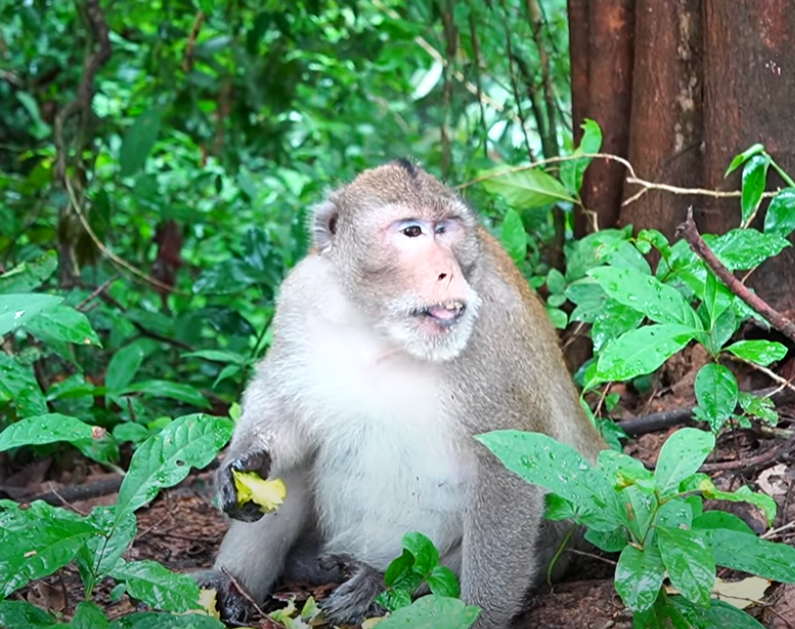

In the golden light of early morning, deep inside the ancient Angkor Wat forest, Monkey Balu sat silently on a rock, his small chest rising and falling with a steady rhythm. To an outsider, he looked calm now—but only hours ago, his world had been full of confusion, fear, and the sting of rejection.
Balu is not the biggest, nor the strongest monkey in his group. He’s gentle, cautious, and still learning how to navigate the complex social web of wild macaque life. What happened to him today could break any young monkey’s spirit—but Balu? He showed the kind of quiet strength that reminds us why we care so deeply for these animals.
It began early, just after sunrise. As the group foraged near the temple stones, there was a sudden outburst of aggression. An older, dominant male wrongly accused Balu of taking food that wasn’t his. The scuffle was brief but terrifying. Balu was chased, slapped hard to the ground, and left visibly shaken. He didn’t even defend himself. He simply ran.
The rest of the group, caught up in the morning chaos, didn’t seem to notice. But I did. I watched as Balu hid behind a thick tree root, his tiny hands trembling, his eyes wide with betrayal. This wasn’t just a squabble—it was a moment of social exile.
For a baby monkey, especially one still learning to read the moods and hierarchies of the troop, these moments can leave deep emotional wounds. As he crouched in silence, other young monkeys played nearby—laughing, chasing, climbing freely. But Balu didn’t move. He didn’t even look at them.
He spent most of the morning alone, licking his little arm where he had been struck. Occasionally, he peeked around the tree, as if hoping someone would come and check on him. No one did.
But just before noon, something beautiful happened.
A young mother—perhaps sensing Balu’s pain—approached him slowly. She wasn’t his mom, but she extended a gentle hand, brushing his cheek with her fingers. Balu didn’t flinch. For a full minute, they stayed close, and Balu finally curled up beside her. He wasn’t fully accepted again, but in that quiet gesture, he was no longer invisible.
By afternoon, Balu began to follow the group from a safe distance. His steps were hesitant, but more confident than before. He paused near the base of a tree and found a fallen fig. Carefully, he nibbled at it while keeping one eye on the troop.
That’s when his mother finally returned from foraging. She spotted Balu, called softly, and reached out her arms. In a flash, he ran to her, burying his face into her fur. The reunion was tender, full of warmth and comfort.
In the complex, ever-shifting world of monkey politics, days like this are a test. And while Balu didn’t win any battles or climb the ranks, he survived a painful, emotional storm—and found his way back into the warmth of companionship.
As I sat watching him that evening, gently grooming his mom’s fur and resting peacefully under the shade of the banyan tree, I felt something shift in me. It’s easy to love monkeys when they play, cuddle, or leap through trees. But it’s in their quiet resilience—the way they endure pain, wait in hope, and accept love when it finally returns—that they teach us something powerful about ourselves.
Balu made it through. Not just physically, but emotionally. And for that, I am deeply moved.